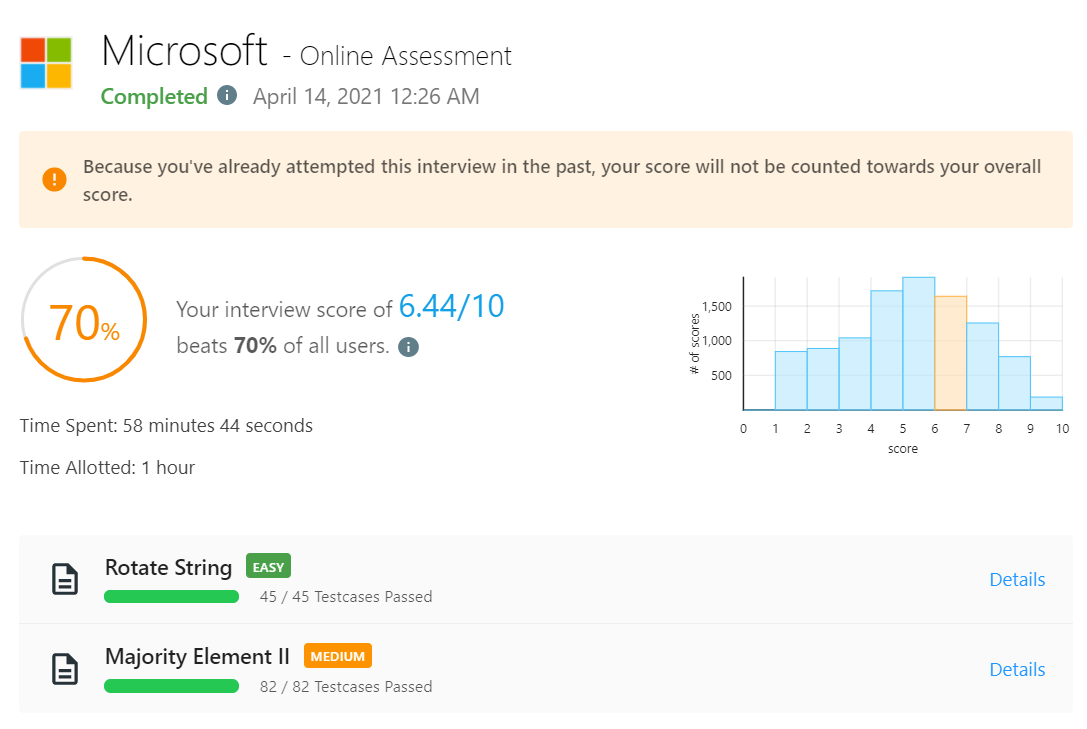
Rotate String
class Solution {
public boolean rotateString(String A, String B) {
if (A.length() != B.length()) {
return false;
}
return helper(A, B, 0);
}
private boolean helper(String A, String B, int times) {
if (A.equals(B)) {
return true;
}
if (times >= A.length()) {
return false;
}
String newA = A.substring(1) + A.substring(0, 1);
return helper(newA, B, times + 1);
}
}Runtime: 0 ms, faster than 100.00% of Java online submissions for Rotate String.
Memory Usage: 37.4 MB, less than 23.53% of Java online submissions for Rotate String.
루션이는 분명 한줄이었는데... RG?^^
소름돋는 이야기
저 interview에다가는 시간이 촉박해서
class Solution {
public boolean rotateString(String A, String B) {
if (A.length() != B.length()) {
return false;
}
if (A.length() == 0) {
return true;
}
return helper(A, B, 0);
}
private boolean helper(String A, String B, int times) {
if (times >= A.length()) {
return false;
}
if (A.equals(B)) {
return true;
}
String newA = A.substring(1) + A.substring(0, 1);
return helper(newA, B, times + 1);
}
}이렇게 넣었거든요?
근데 제출하고 보니깐 A.equals(B)가 먼저 오면 A.length() == 0가 없어도 된다는 것을 깨달아서 런타임도 더럽게 느린데 바꿔봤거든요???
그랬더니 30%에서 100%됨;
충격소름실화입니다.
런타임: O(n^2)
루션이
class Solution {
public boolean rotateString(String A, String B) {
return A.length() == B.length() && (A + A).contains(B);
}
}O(n^2)
^^
KMP ALGORITHM
class Solution {
private int[] getLPS(String a){
int i = 1, j = 0;
int n = a.length();
int[] lps = new int[n];
while(i < n){
if(a.charAt(j) == a.charAt(i)){
lps[i] = j + 1;
i++;
j++;
}
else{
if(j == 0)lps[i++] = 0;
else j = lps[j-1];
}
}
return lps;
}
private boolean contains(String a, String b){
int[] lps = getLPS(b);
int i = 0, j = 0;
int n = a.length(), m = b.length();
while(i < n && j < m){
if(a.charAt(i) == b.charAt(j)){
i++;
j++;
}
else{
if(j == 0) i++;
else j = lps[j-1];
}
}
return j == m;
}
public boolean rotateString(String A, String B) {
return A.length() == B.length() && contains(A+A, B);
}
}Majority Element 2
class Solution {
public List<Integer> majorityElement(int[] nums) {
//아 이거 한칸 띄우기 어쩌구 있었는데
//at max 2 majority element!!
List<Integer> result = new ArrayList<Integer>();
int maj1 = nums[0];
int count1 = 1;
while (count1 < nums.length && nums[count1] == maj1) {
count1++;
}
if (count1 == nums.length) {
result.add(maj1);
return result;
}
int maj2 = nums[count1];
int count2 = 1;
for (int i = count1 + 1; i < nums.length; i++) {
if (nums[i] == maj1) {
count1++;
} else if (nums[i] == maj2) {
count2++;
} else if (count2 <= 0) {
maj2 = nums[i];
count2 = 1;
} else if (count1 <= 0) {
maj1 = nums[i];
count1 = 1;
} else {
count1--;
count2--;
}
}
count1 = 0;
count2 = 0;
for (int j = 0; j < nums.length; j++) {
if (nums[j] == maj1) {
count1++;
} else if (nums[j] == maj2) {
count2++;
}
}
if (count1 > nums.length / 3) {
result.add(maj1);
}
if (count2 > nums.length / 3) {
result.add(maj2);
}
return result;
}
}Runtime: 1 ms, faster than 99.82% of Java online submissions for Majority Element II.
Memory Usage: 43.2 MB, less than 21.76% of Java online submissions for Majority Element II.
이 루션이 충격적이었던 기억이 나서 풀었읍니다^^
1/3이상 갈 수 있는 수가 최대 2개니깐 그 점을 이용해서 빼고 더하는 방식~
루션이
class Solution {
public List < Integer > majorityElement(int[] nums) {
// 1st pass
int count1 = 0;
int count2 = 0;
Integer candidate1 = null;
Integer candidate2 = null;
for (int n: nums) {
if (candidate1 != null && candidate1 == n) {
count1++;
} else if (candidate2 != null && candidate2 == n) {
count2++;
} else if (count1 == 0) {
candidate1 = n;
count1++;
} else if (count2 == 0) {
candidate2 = n;
count2++;
} else {
count1--;
count2--;
}
}
// 2nd pass
List result = new ArrayList <> ();
count1 = 0;
count2 = 0;
for (int n: nums) {
if (candidate1 != null && n == candidate1) count1++;
if (candidate2 != null && n == candidate2) count2++;
}
int n = nums.length;
if (count1 > n/3) result.add(candidate1);
if (count2 > n/3) result.add(candidate2);
return result;
}
}찐 루션이가 조금 더 깔끔하네요
저는 후보를 정하고 시작했는데 루션이는 후보를 안정하고 one pass로 돌릴 수 있다는 점~
런타임: O(N)
